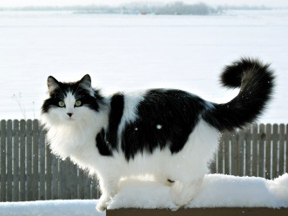Cold Weather Safety
Keep your pets warm, dry and healthy.
By Lisa King
Right now much of the East Coast and Midwest is suffering record cold. We’re all familiar with the dangers this kind of weather poses for people, but pets are even more vulnerable. A simple rule to follow in extreme cold is to keep your pets inside with you as much as possible. Here are some tips to keep dogs and cats safe.
- Cats should be kept inside all the time, but especially in very cold weather. They tend to seek shelter when it’s cold, and can crawl into dumpsters or other spaces and become trapped. They can also suffer frostbite or hypothermia, become lost or freeze to death.
- Your dog’s susceptibility to the cold depends on many factors, including age, health, length of coat, breed and weight. If you have a healthy Alaskan Malamute or Siberian Husky, he will love an occasional frolic in the snow. Small, thin or short-haired dogs feel the cold much more acutely and should wear dry doggie coats or sweaters and possibly booties when venturing outside. These sorts of dogs should go out only to relieve themselves when temperatures fall below zero. Very young or very old pets and pets with chronic illnesses cannot regulate their body temperatures as well as healthy adult dogs. Hypothermia and frostbite on feet, ears or tailcan affect any pet.
- When you do take your dog outside in the cold, stay with him. On walks, keep him on leash at all times. Dogs can lose their way in the snow because scents they depend on to find their way home are muffled. Make sure your dog has a current ID tag on his collar and has been microchipped. Don’t let your dog walk on frozen water, such as a pond or lake. If he falls through the ice he might die of hypothermia. If he gets wet, use a blow dryer or towel to dry him.
- If your dog must stay outside for any length of time, provide plenty of unfrozen fresh water. A heated water dish comes in handy. Also provide a sturdy shelter with soft bedding, such as straw. Make sure the floor is raised off the ground and that the door faces away from the wind. A door flap will help him retain heat.
- If your dog begins shivering or whining, or otherwise appears to be in distress, get him inside immediately and warm him up.If symptoms persist, contact your veterinarian.
- If you plug in a space heater or light a fire, don’t leave pets near them unattended. Use screens in front of all fireplaces.
- Antifreeze is very toxic to pets and de-icing salts and other chemicals can get on your dog’s feet and cause irritation. Clean his feet after he comes in from a walk.
- Cold weather is just as dangerous as hot weather to a dog left in a car. A parked car can turn into an icebox after too long in freezing temperatures.
- If you park your car outside, check under the hood and make plenty of noise before starting it to make sure no feral or other outdoor cats have sought out the warmth of the engine.
- Never shave a long-haired dog or cat in cold weather. It may be easier to groom a shaved Persian cat, but she needs her fur to keep warm. Brush your long-haired pet’s coat regularly to prevent mats. If your dog has longish hair between his paw pads, trim it to reduce snow and ice buildup.
- Make sure all your pets have warm, draft-free places to sleep. Pet supply stores carry heated mats and beds that your dog or cat will appreciate when temperatures are low. Arthritis is aggravated by the cold, so a warm, soft bed can help an arthritic pet stay comfortable.
As the arctic blast that is slamming most of the U.S. recedes and temperatures rise to a more typical winter range, you and your dog can spend more time outside enjoying the snowy landscape. But please leave Kitty indoors.
About the Author: Lisa King is a freelance writer living in Southern California. She is the former managing editor of Pet Product News International, Dogs USA and Natural Dog magazines. Lisa is also the author of the well-received murder mystery novel “Death in a Wine Dark Sea.”





